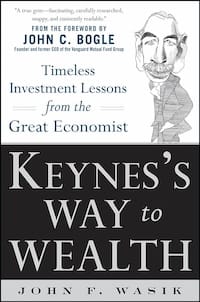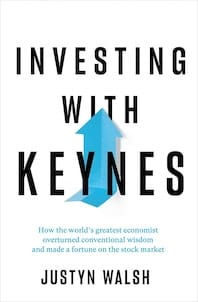Book Notes: Keynes on Investing
If you understand chapters 8 and 20 of The Intelligent Investor and chapter 12 of The General Theory, you don’t need to read anything else and you can turn off your TV.
Buffett is referring to Chapter 12 of Keynes' The General Theory.
About Keynes: John Maynard Keynes, a true Renaissance man, stands out as one of the most brilliant and versatile intellectuals of the 20th century. His extraordinary achievements span various domains, including his roles as a renowned economist, bureaucrat (serving on the HMS India desk), negotiator (during World War I), art collector, speculator (running a hedge fund), investor (chairing an insurance company), writer, statesman (key architect of the Bretton Woods system), and member of the Bloomsbury group.

The General Theory
In 1936, Keynes published his masterpiece, The General Theory of Employment, Interest, and Money, which revolutionized economic thought by uncovering the inverse relationship between unemployment and inflation. This seminal work became a guiding light for governments, providing a roadmap for navigating their economies out of recessions through the implementation of effective fiscal and monetary policies.Chapter 12
The State of Long Term Expectation
In this thought-provoking chapter, Keynes delves into the realm of investing. Despite being written nearly a century ago, the insights contained within this chapter remain remarkably relevant and valuable to investors in today's complex financial landscape.
Interestingly, this chapter is littered with quotes that you now read everywhere, including my favorite:
Worldly wisdom teaches that it is better for reputation to fail conventionally than to succeed unconventionally
Let's explore the key messages from this chapter that remain highly relevant to investors even today.
The Impact of Stock Exchanges and Liquidity
Keynes discusses the impact of stock exchanges and the separation of ownership and management on investment decisions.
"Decisions to invest in private business of the old-fashioned type were, however, decisions largely irrevocable, not only for the community as a whole, but also for the individual. With the separation between ownership and management which prevails to-day and with the development of organised investment markets, a new factor of great importance has entered in, which sometimes facilitates investment but sometimes adds greatly to the instability of the system.
This new factor is Liquidity, which encourages holders to revalue their investments everyday.
In the absence of security markets, there is no object in frequently attempting to revalue an investment to which we are committed. But the Stock Exchange revalues many investments every day and the revaluations give a frequent opportunity to the individual (though not to the community as a whole) to revise his commitments.
It is as though a farmer, having tapped his barometer after breakfast, could decide to remove his capital from the farming business between 10 and 11 in the morning and reconsider whether he should return to it later in the week.
Short-term Market Sentiment vs. Long-term Value
Keynes argues that the focus of professional investors and speculators on short-term market sentiment rather than long-term fundamental value is detrimental:
..the energies and skill of the professional investor and speculator are mainly occupied otherwise. For most of these persons are, in fact, largely concerned, not with making superior long-term forecasts of the probable yield of an investment over its whole life, but with foreseeing changes in the conventional basis of valuation a short time ahead of the general public. They are concerned, not with what an investment is really worth to a man who buys it "for keeps", but with what the market will value it at
The "Fetish of Liquidity"
Keynes criticizes the "fetish of liquidity" and argues that the true purpose of skilled investment should be to overcome future uncertainties:
Of the maxims of orthodox finance none, surely, is more anti-social than the fetish of liquidity, the doctrine that it is a positive virtue on the part of investment institutions to concentrate their resources upon the holding of "liquid" securities.
It forgets that there is no such thing as liquidity of investment for the community as a whole.
The social object of skilled investment should be to defeat the dark forces of time and ignorance which envelop our future.
The Beauty Contest Metaphor
The famous "beauty contest" metaphor is introduced by Keynes to illustrate how investors try to anticipate market sentiment rather than focusing on fundamental value:
Or, to change the metaphor slightly, professional investment may be likened to those newspaper competitions in which the competitors have to pick out the six prettiest faces from a hundred photographs, the prize being awarded to the competitor whose choice most nearly corresponds to the average preferences of the competitors as a whole; so that each competitor has to pick, not those faces which he himself finds prettiest, but those which he thinks likeliest to catch the fancy of the other competitors, all of whom are looking at the problem from the same point of view. It is not a case of choosing those which, to the best of one's judgment, are really the prettiest, nor even those which average opinion genuinely thinks the prettiest.
The Challenges and Skills Required for Long-Term Investing
Keynes discusses the difficulties faced by long-term investors in the modern market environment:
Investment based on genuine long-term expectation is so difficult to-day as to be scarcely practicable. He who attempts it must surely lead much more laborious days and run greater risks than he who tries to guess better than the crowd how the crowd will behave..
Keynes argues that successful long-term investing requires greater skill and intelligence than simply trying to outpace the market in the short term:
It needs more intelligence to defeat the forces of time and our ignorance of the future than to beat the gun. Moreover, life is not long enough; — human nature desires quick results, there is a peculiar zest in making money quickly, and remoter gains are discounted by the average man at a very high rate.
The game of professional investment is intolerably boring and over-exacting to anyone who is entirely exempt from the gambling instinct; whilst he who has it must pay to this propensity the appropriate toll.
The Perils of Going Against Market Sentiment
Keynes observes that long-term investors often face criticism for going against prevailing market sentiment:
it is the long-term investor, he who most promotes the public interest, who will in practice come in for most criticism, wherever investment funds are managed by committees or boards or banks.
For it is in the essence of his behaviour that he should be eccentric, unconventional and rash in the eyes of average opinion. If he is successful, that will only confirm the general belief in his rashness; and if in the short run he is unsuccessful, which is very likely, he will not receive much mercy.
Worldly wisdom teaches that it is better for reputation to fail conventionally than to succeed unconventionally.
The Dangers of Speculation
Keynes warns that excessive speculation can lead to inefficient allocation of resources and hinder a country's capital development.
Speculators may do no harm as bubbles on a steady stream of enterprise. But the position is serious when enterprise becomes the bubble on a whirlpool of speculation.
When the capital development of a country becomes a by-product of the activities of a casino, the job is likely to be ill-done.
Potential Remedies and the Role of "Animal Spirits"
A provocative suggestion is made by Keynes that making investments permanent and binding, like marriage, could be a potential solution to excessive speculation.
"The spectacle of modern investment markets has sometimes moved me towards the conclusion that to make the purchase of an investment permanent and indissoluble, like marriage, except by reason of death or other grave cause, might be a useful remedy for our contemporary evils."
Lastly, Keynes emphasizes the crucial role of "animal spirits" in driving economic activity and keeping the economy moving forward:
..if the animal spirits are dimmed and the spontaneous optimism falters.... enterprise will fade and die.....it is our innate urge to activity which makes the wheels go round.
Implication for investors
Keynes's insights continue to hold significant relevance in today's financial markets. His perspectives on long-term investing, the critical role of "animal spirits," and the risks associated with speculation offer timeless wisdom for contemporary investors. By embracing these principles, investors can develop a more thoughtful and balanced investment strategy.
You can read this chapter online; it's quite short, just around a dozen pages.
If you want to read more about Keynes as an investor, you must try these books:

|

|

Member discussion